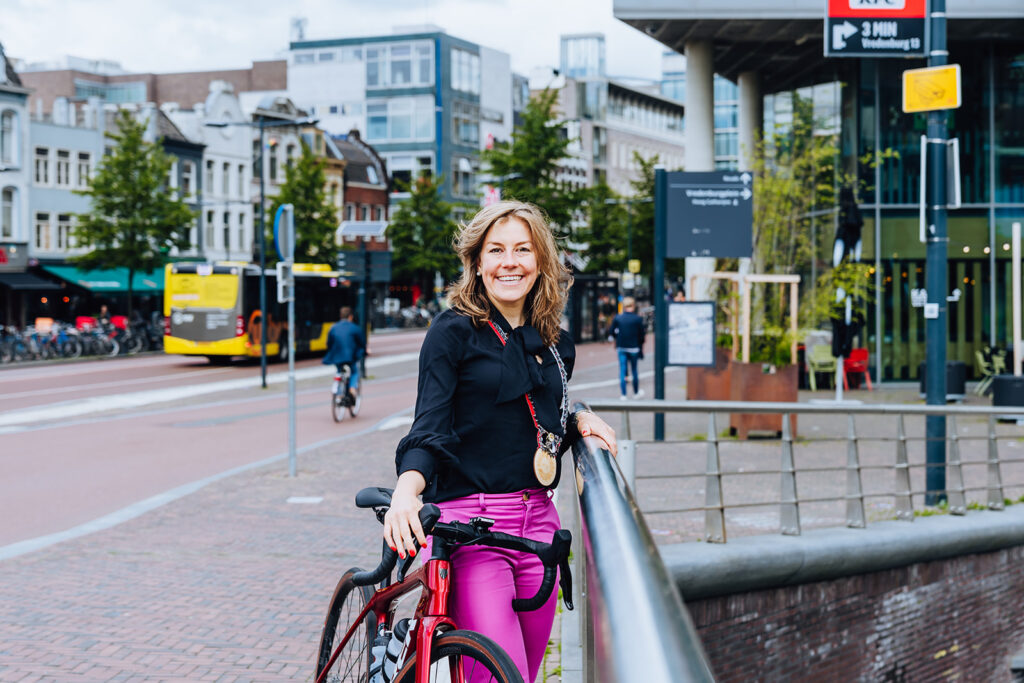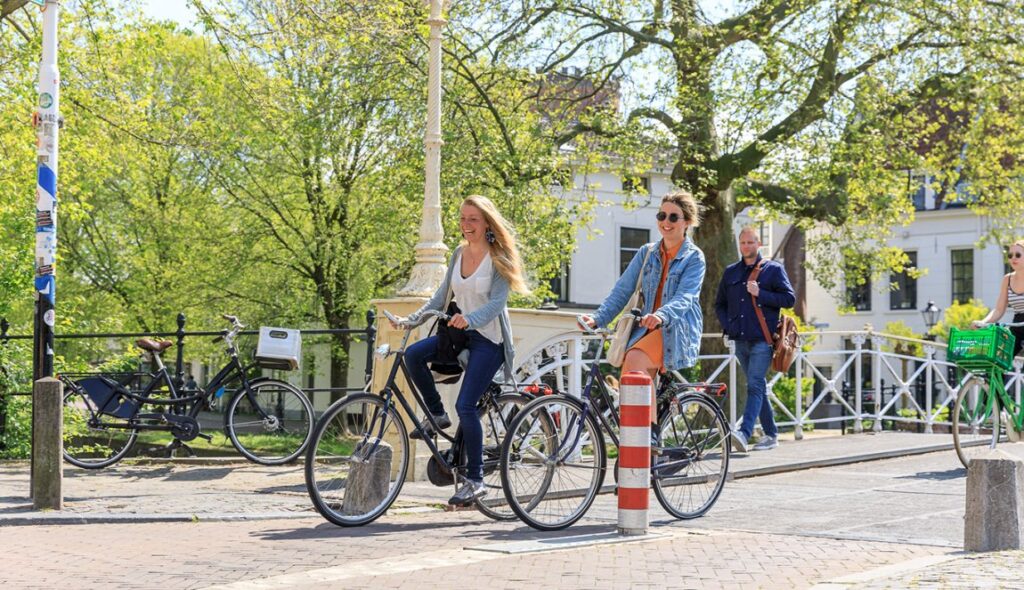Active travel lessons from the world’s most cycle-friendly city
Improving active travel provision brings emissions down, improves air quality, and promotes healthier lifestyles. Martin Guttridge-Hewitt asks Belle de Gast, the woman responsible for cycle culture in the world’s bike capital for some life lessons. 
In 2019 the Dutch made 4.8billion trips by bicycle, covering 10.9billion miles. Every resident rode 1.8miles each day that year, totalling 680miles per person. This dwarfs figures in the UK, where the total distance cycled for the same period equated to just 54miles per person.
Suffice to say, then, the Netherlands has a lot to teach us when it comes to encouraging bicycle uptake, and there are few places better to start learning than Utrecht. A picturesque town, at the start of this decade it completed a major engineering project, converting the Catherijnesingel canal back into a waterway, bringing to an end its 50 year stretch as an emissions spewing 12-lane motorway.
Now lined with wildflowers, it plays into biodiversity goals and, by cutting traffic, contributes to air quality improvements. Notably, restricting capacity for cars hasn’t increased congestion, either. This is for a number of reasons, including Utrecht’s exceptional cycling infrastructure. Residents don’t really need to look beyond their bikes to commute, a masterplan the city as been working on for almost 150 years.
Maliebaan, a short stretch of park-side cycleway, first opened in 1885 as the first bicycle path in the Netherlands. The first major undertaking of the Algemene Nederlandsche Wielrijders-Bond (Royal Dutch Tourist Association), established two years earlier by a group of cyclists, it laid the foundations for what we see today. According to the 2022 Global Bicycle Index, Utrecht is officially the most cycle-friendly city on the planet, and Belle de Gest is understandably proud of that.
A celebrated racing cyclist, this summer de Gest became Utrecht’s Bicycle Mayor, joining the global Bicycle Mayor Network launched by Dutch NGO BYCS in 2016 to support community-led urban change through cycling. As much about awareness, policy and publicity for active travel as knowledge-sharing, representatives want to engage with relevant organisations in other parts of the world to improve cycling provision.

‘I think we can all learn from each other – Utrecht is doing a lot of good things, and almost everywhere else can learn from this, but it’s not that we can’t improve too,’ says de Gest, citing safety as a big concern in the Netherlands, where ‘helmet culture’ is not as prominent as elsewhere. ‘But it’s difficult, in Utrecht, and the Netherlands, we have real cycling societies, everybody is used to it. In the UK, you can’t just copy what we do because it’s not so much part of the culture.
‘I would say to anyone it’s important to work together with big companies, and the local government,’ she continues, explaining the role of Bicycle Mayor means liaising with municipal authorities but being independent from them. ‘It can be difficult when you are trying to work alone… I’m in a nice situation, if I go to the local government everybody, or almost everybody, can see the importance of a bike. That makes it much easier to find money and support.’
As de Gest explains, a proven way of engaging with the private sector is through incentivised cycle to work, which in the Netherlands often means making it financially beneficial to commute by bike. Simply put, getting more people to leave the car at home each morning is all about behavioural change, and that becomes far easier when individuals have something tangible to gain. ‘You can say to your friends, it’s good to go by bike for CO2 pollution, or the children, but they can easily think ‘that’s not my problem’. it’s important to look at it in other ways, like what benefits them.
‘In a lot of cities, the whole environment is made for the car. In Utrecht, especially in the city centre, it’s the other way round. So the car is a guest in our inner city, and bikes are the main thing on the road. Everything is built around the bike. If it’s really dangerous to take your kids to school on a bike, then what do we expect people to do,?’ asks de Gest, before revealing that even in a town focused on cycling, keeping ridership high is a battle for hearts and minds, and winning reliant on spotlighting value, rather than access and infrastructure.

‘We talk about three subjects. One is the link between health and bikes and how we can reduce high costs in the health sector [through more active lifestyles],’ de Gest says. ‘In the Netherlands, most people still go to work by car, and it’s not realistic for everyone to go by bike, but the challenge is image. Like in the UK, here it’s cool to have a nice car, and often a sign of a good job, your job may even provide the car. I don’t know how exactly, but we need to make the bike cool, and deliver messages about the future – like your health, and children.’
A relatively recent phenomenon in the Netherlands as a whole, de Gest’s third point relates to falling cycling rates among younger age groups since the turn of the 21st Century. In 2008, 79% of Dutch children aged between nine and 11 cycled to school independently. Today, that has plummeted to 54%, a drop attributed to two things: increasing concern about cars and drivers, and more general worries over safeguarding vulnerable minors. And it’s not just the number of actual commutes. According to road safety organisation VVN, fewer Dutch kids are taking cycling tests, too, suggesting numbers will continue to decline in coming years..
Clearly, then, de Gest has plenty to do. As do policymakers here in the UK, where some authorities have made major inroads with cycle lanes and infrastructure, while others are still trying to pedal. With public opinion on improvements divided, not least when they result in disruptive roadworks, and Downing Street’s spring announcement of a one-third budget cut for Active Travel England, increasing provision for cycling remains an uphill task, and maximising resources is essential. As such, figureheads such as de Gest, and other Bicycle Mayors, are invaluable reference points for anyone involved in local transport decisions.
More features and opinion:
An effective climate economy needs valid remote sensing data
Limiting local authority powers doubles down on Britain’s climate inaction
Images: Discover Utrecht
















